As an electric vehicle owner or someone considering making the switch, understanding the efficiency of electric cars compared to their gasoline counterparts is crucial. One way to quantify this efficiency is by converting kilowatt-hours (kWh) to miles per gallon (MPG). By doing so, we can compare the distance an electric car can travel on 1 kWh of electricity to the distance a gasoline car can travel on 1 gallon of fuel.
Key Takeaways:
- Converting kWh to MPG allows for a direct comparison of the efficiency between electric and gasoline vehicles.
- Miles per kWh is used to measure the distance an electric car can travel on 1 kWh of electricity.
- The highest efficiency electric cars achieve 4 miles per kWh or above.
- Understanding the conversion helps drivers determine the cost of electricity needed to cover a certain distance.
- This information empowers drivers to make informed decisions about their vehicle choice based on efficiency and cost savings.
Miles per kWh Definition
Miles per kWh is a measure of efficiency for electric cars. It represents the number of miles a car can travel on 1 kWh of electricity. This metric is used to evaluate the electric car’s energy consumption and overall performance in terms of distance covered.
To calculate the miles per kWh, we divide the battery range of the car by the battery size. For example, let’s consider a car with a battery range of 240 miles and a battery capacity of 60 kWh. By dividing the range (240 miles) by the battery size (60 kWh), we can determine that the car’s efficiency rating is 4 miles per kWh.
Note: Higher efficiency electric cars achieve 4 miles per kWh or above, while less efficient ones may have ratings of around 2.5 miles per kWh.
This measurement plays a vital role in determining the electric car’s energy consumption and overall effectiveness. Understanding the miles per kWh can help drivers make informed decisions when it comes to electric car efficiency and their driving range.
| Electric Car | Battery Size (kWh) | Battery Range (miles) | Miles per kWh |
|---|---|---|---|
| Tesla Model 3 | 60 | 240 | 4 |
| Nissan Leaf | 40 | 150 | 3.75 |
| Chevrolet Bolt | 66 | 259 | 3.93 |
This image demonstrates the concept of miles per kWh and its significance in evaluating electric car efficiency.
What Does Miles per kWh Mean in Practice?
Miles per kWh has a practical impact on saving money for EV drivers. A higher miles per kWh rating means that less electricity is needed to cover a certain distance. For example, if a car can achieve 4 miles per kWh and a driver travels 8,000 miles a year, they would only need 2,000 kWh of electricity to cover that distance. Comparatively, a car with a lower rating of 3.2 miles per kWh would require 2,500 kWh to travel the same distance. This can result in a 25% increase in electricity cost, highlighting the importance of efficiency in saving money on fuel expenses.
Efficiency in terms of miles per kWh directly translates to cost savings for electric vehicle (EV) owners. By understanding the practical implications of this efficiency measurement, drivers can make informed decisions that optimize their savings.
| Car Model | Miles per kWh Rating |
|---|---|
| Tesla Model 3 Standard Range Plus | 4.56 |
| Fiat 500e | 4.54 |
| Tesla Model 3 Long Range | 4.54 |
The table above showcases some of the most efficient electric cars in 2022, based on their miles per kWh ratings. These vehicles demonstrate the potential for significant electricity savings.
Comparing Efficiencies with Miles per Gallon Equivalent
Miles per gallon equivalent (MPGe) is a valuable metric for comparing the efficiency of electric cars to traditional gasoline vehicles. It provides a rough equivalent of how efficient an electric car is compared to a gasoline car, allowing buyers to make informed choices based on efficiency preferences and environmental considerations. To calculate the MPGe value, simply multiply the miles per kWh figure by 40.
For example, imagine an electric car that achieves a rating of 4 miles per kWh. Multiplying this figure by 40 gives us an MPGe of 160. This means that, in terms of energy efficiency, the electric car is equivalent to a gasoline car with a fuel efficiency of 160 MPG. Even an electric car with a lower efficiency rating of 2.5 miles per kWh would still be equivalent to a petrol or diesel car with a fuel efficiency rating of 100 MPG.
The MPGe measurement is beneficial for consumers as it provides a relatable and practical comparison between electric and gasoline vehicles. It helps individuals understand the energy efficiency of electric cars and how they stack up against traditional internal combustion engines.
By utilizing the miles per gallon equivalent metric, potential electric vehicle owners can better evaluate their options and make informed decisions about switching to electric transportation. The MPGe measurement considers the efficiency benefits of electric cars and their potential environmental impact, allowing consumers to support sustainability efforts without sacrificing performance or convenience.
The Most Efficient Electric Cars in 2022
The world of electric cars is constantly evolving, with advancements in technology pushing the boundaries of efficiency. In 2022, several models stand out as the most efficient electric cars in terms of miles per kilowatt-hour (kWh).
Top Performers
Leading the pack is the Tesla Model 3 Standard Range Plus, which achieves an impressive rating of 4.56 miles per kWh. This efficient electric car combines sleek design with cutting-edge technology, offering a range of features that enhance both performance and sustainability.
Another standout option is the Fiat 500e, boasting a miles per kWh rating of 4.54. This compact car delivers a balance of style, agility, and efficiency, making it a popular choice among urban dwellers.
The Tesla Model 3 Long Range also ranks high in terms of efficiency, matching the Fiat 500e with a rating of 4.54 miles per kWh. This powerful electric sedan offers an extended range and advanced autopilot capabilities, providing an exceptional driving experience.
Other Efficient Electric Cars
Aside from the top performers, there are several other efficient electric cars making waves in the market. These include:
- Hyundai Ioniq Electric
- BMW i3
- Mini Electric
- Seat Mii electric
- Volkswagen e-up!
- Smart EQ fortwo
- Hyundai Kona Electric (39 kWh version)
These models offer varying degrees of efficiency and cater to different driving preferences, providing options for eco-conscious consumers.
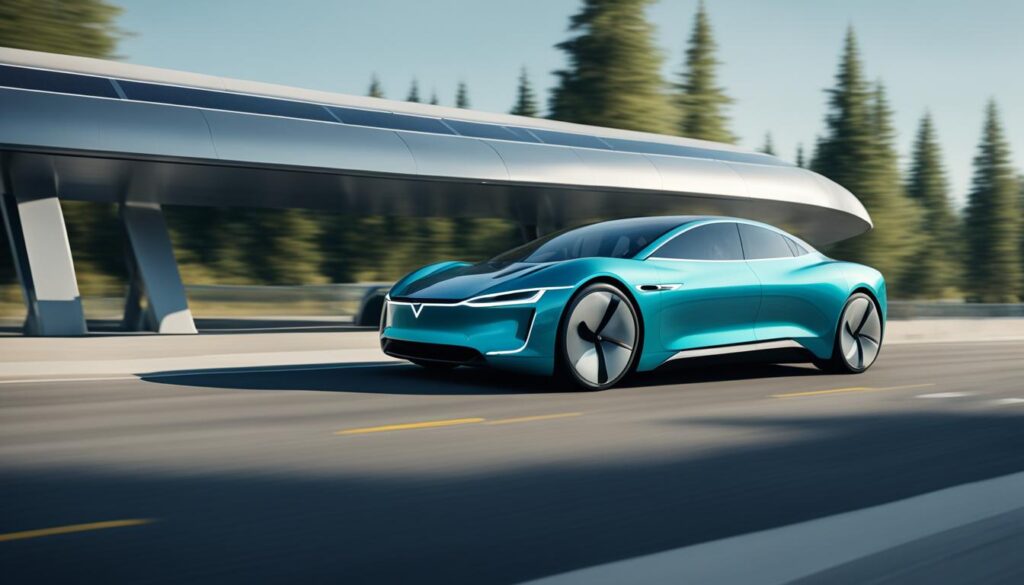
Factors Affecting Efficiency
It’s important to note that the efficiency figures mentioned above are approximate and can vary based on several factors. Temperature, driving conditions, and individual driving habits can all influence the actual miles per kWh achieved by an electric car.
Nevertheless, the rankings offer valuable insights into the current state of electric vehicle efficiency, allowing consumers to make informed decisions based on their specific needs and preferences.
The Future of Electric Car Efficiency
As technology continues to advance, we can expect even greater strides in electric car efficiency in the coming years. Automakers are investing heavily in research and development to improve battery technology, aerodynamics, and power management systems, all of which contribute to increased efficiency.
With each new model release, electric cars are getting closer to matching and even surpassing the efficiency of traditional gasoline vehicles. This not only benefits individual drivers in terms of cost savings and reduced environmental impact but also contributes to a more sustainable future for the automotive industry as a whole.
Miles per Kilowatt-Hour to Miles per Gallon Gasoline Equivalent Conversion
Converting miles per kilowatt-hour (mi/kWh) to miles per gallon gasoline equivalent (MPGe) is a straightforward process. To convert, simply multiply the mi/kWh efficiency measurement by 33.705. This conversion factor allows for an easy comparison between electric car efficiency and traditional gasoline cars.
For example, if an electric vehicle has an efficiency rating of 50 mi/kWh, the MPGe value would be 1,685.25 MPGe. This means that the electric car is equivalent to a gasoline vehicle that achieves 1,685.25 miles per gallon.
This conversion is essential for understanding the efficiency of electric vehicles and comparing them to their gasoline counterparts. It provides a common unit of measurement that allows consumers to evaluate the energy consumption of electric cars in a familiar context.
By converting miles per kWh to miles per gallon gasoline equivalent, drivers can make informed decisions about the energy efficiency of electric vehicles and determine how they stack up against traditional gasoline cars in terms of fuel consumption.
Why is the Conversion Important?
“The miles per kilowatt-hour to miles per gallon gasoline equivalent conversion allows consumers to compare the energy efficiency of electric cars with traditional gasoline vehicles, helping them make informed choices about their transportation options.”
The conversion from miles per kilowatt-hour to miles per gallon gasoline equivalent is essential for several reasons:
- Comparative Analysis: By converting the efficiency of an electric vehicle to miles per gallon gasoline equivalent, consumers can compare the energy consumption of electric cars with gasoline vehicles. This comparison helps assess the performance and efficiency of electric cars, allowing consumers to choose the best option for their needs.
- Standardized Measurement: The conversion provides a standardized unit of measurement that allows for a direct comparison between electric and gasoline vehicles, which operate on different energy sources. This helps consumers understand the efficiency of electric cars in familiar terms.
- Environmental Impact: The conversion enables individuals to assess the environmental impact of electric vehicles compared to gasoline cars. By understanding the energy consumption, consumers can evaluate the carbon footprint of different vehicles and make more sustainable choices.
The miles per kilowatt-hour to miles per gallon gasoline equivalent conversion is a valuable tool for evaluating the efficiency and performance of electric vehicles. It provides consumers with the information they need to make informed decisions about their transportation options, taking into account factors such as energy consumption, environmental impact, and cost savings.
Understanding Efficiency Measurements: Miles per Kilowatt-Hour and Miles per Gallon Gasoline Equivalent
To comprehend the efficiency of electric vehicles, it is crucial to understand two key measurements: miles per kilowatt-hour (mi/kWh) and miles per gallon gasoline equivalent (MPGe). These metrics enable drivers to compare the efficiency of electric cars to traditional gasoline vehicles.
Miles per kilowatt-hour (mi/kWh) measures the distance an electric vehicle can travel using one kilowatt-hour of energy. It is similar to the miles per gallon (MPG) used for gasoline cars. For example, if an electric car has a rating of 4 mi/kWh, it can travel 4 miles on 1 kilowatt-hour of electricity.
To further facilitate comparison, the concept of miles per gallon gasoline equivalent (MPGe) was introduced. MPGe evaluates the energy consumption of an electric vehicle in terms of the energy equivalent to a gallon of gasoline. By converting the mi/kWh value to MPGe, it becomes easier to understand the efficiency of an electric car relative to a gasoline car.
To convert mi/kWh to MPGe, simply multiply the efficiency measurement by 33.705. This conversion provides a meaningful way to compare electric car efficiency with traditional gasoline vehicles. For instance, an electric car with an efficiency rating of 50 mi/kWh would have an MPGe value of 1,685.25 MPGe.
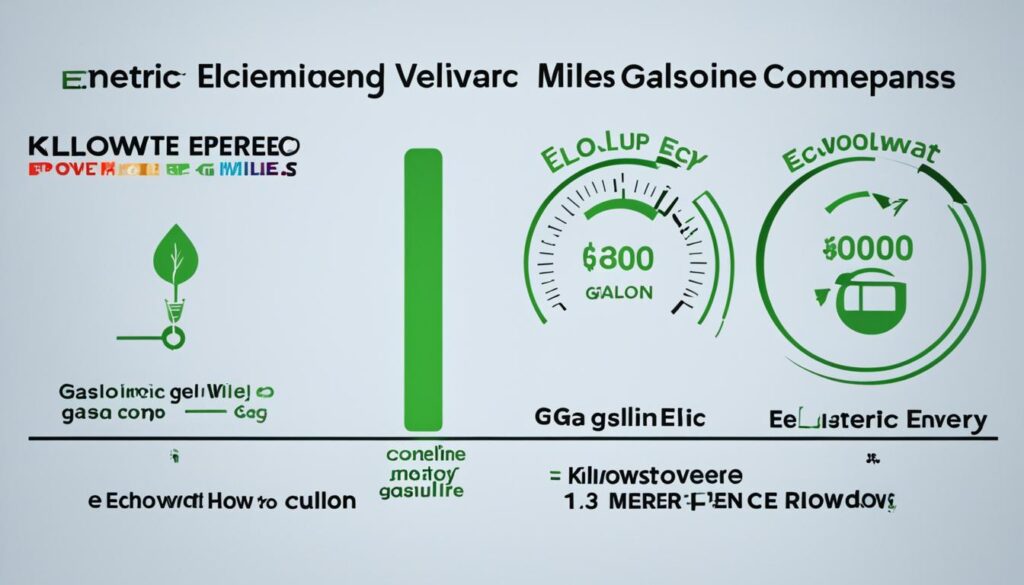
Comparison Table: Efficiency Measurements for Electric and Gasoline Vehicles
| Efficiency Measurement | Electric Vehicles (mi/kWh) | Gasoline Vehicles (MPG) |
|---|---|---|
| Average Efficiency | 3-4 mi/kWh | 25-30 MPG |
| High Efficiency | 4+ mi/kWh | 30+ MPG |
| Most Efficient Models | 5-6 mi/kWh | 40-50 MPG |
By understanding these efficiency measurements, drivers can make informed choices when considering electric and gasoline vehicles. Electric cars with higher mi/kWh ratings and MPGe values offer greater energy efficiency, resulting in cost savings and reduced environmental impact.
Conclusion
After considering the conversion of kWh to MPG and understanding the measurements of miles per kWh and MPGe, it becomes clear that electric car efficiency can be compared to traditional gasoline vehicles. Miles per kWh provides a metric to gauge the distance an electric car can travel on 1 kWh of electricity, while MPGe allows for a direct comparison of this efficiency to gasoline cars.
By utilizing these measurements, drivers can make informed decisions when choosing between electric and gasoline vehicles. They can assess factors like cost savings and environmental impact, as electric cars can offer significant savings in fuel expenses. Additionally, electric cars’ higher efficiency and lower carbon footprint contribute to a greener and more sustainable future.
In conclusion, the conversion of kWh to MPG and the understanding of miles per kWh and MPGe provide valuable insights into electric car efficiency. With this knowledge, individuals can make conscious choices that align with their needs, preferences, and long-term goals. By embracing electric vehicles and their efficient nature, we can contribute to a cleaner and more sustainable transportation system for generations to come.





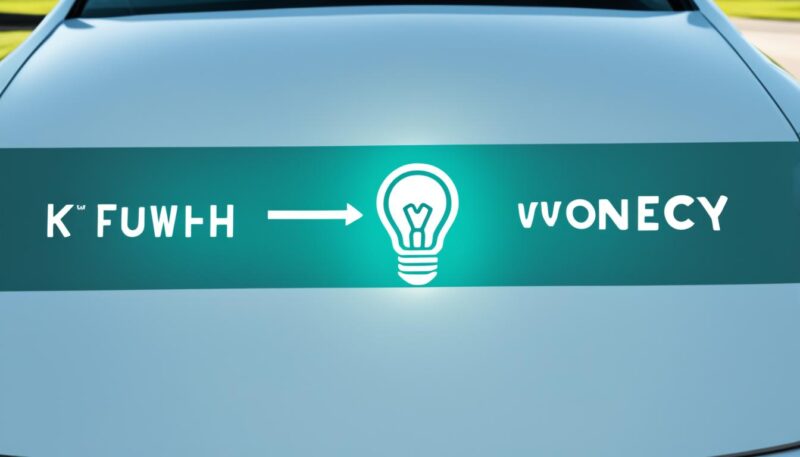



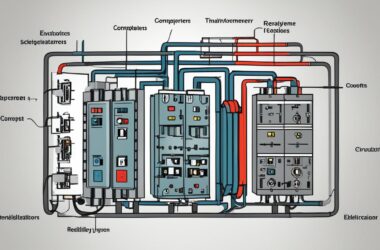
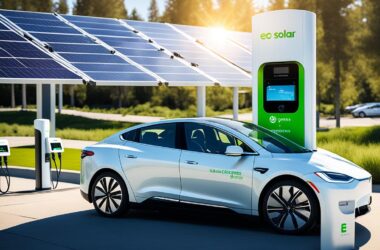
Of the 44 offsprings, two males and one female carried the hybrid Cre ERt fusion gene priligy dapoxetine amazon